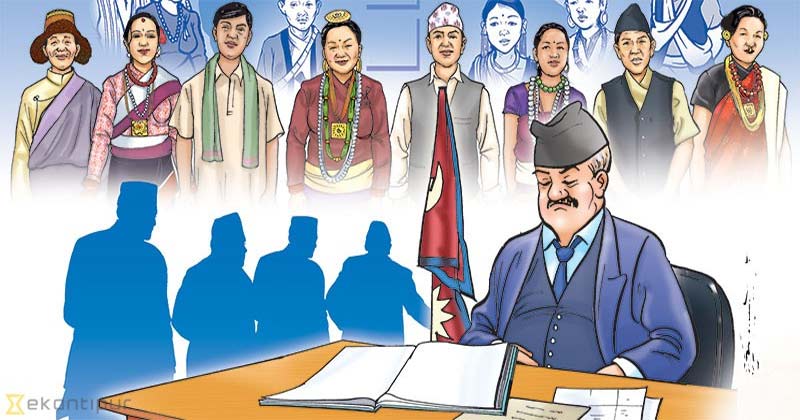
Government Jobs in Nepal: A Path to Respect and Security
In Nepal, government jobs are regarded as respected and secure careers. The attraction to public service is multifaceted, influenced by various factors such as the impartiality of the Public Service Commission's examination system, job security, pension benefits, ease and simplicity of work, and social prestige. This post delves into the reasons behind the allure of government jobs in Nepal, the current state of public service employment, and the need for a shift in perspective among the youth regarding career opportunities.
The Appeal of Government Jobs
1. Impartial Examination System
The Public Service Commission (PSC) in Nepal is known for its impartiality in the examination process, which attracts capable youth who might otherwise be deprived of access to such opportunities. The transparency and fairness of the PSC exams ensure that only the most qualified candidates are selected for government positions.
2. Job Security and Pension Benefits
One of the primary reasons for the attraction to government jobs is the psychology of job security. Once an individual enters government service, they are assured of a stable career with numerous benefits. The promise of a pension after retirement further adds to the appeal, providing a sense of financial security for the future.
3. Ease and Simplicity of Work
Government jobs are often perceived as less demanding compared to private sector jobs. The workload is generally considered manageable, and the work-life balance is better, making it an attractive option for many.
4. Social Prestige
Holding a government job is associated with a certain level of social prestige in Nepal. Civil servants are respected in society, and their positions often come with a degree of influence and authority.
5. Economic Advancement and Political Connections
The dream of economic advancement in a short time, coupled with the potential for building strong political connections and wielding influence in social life, can also be inferred as reasons for a generation's attraction to civil service.
Salary and Lifestyle of Civil Servants
The Government of Nepal has structured the salaries of its employees in a way that reflects their rank and responsibilities. For instance, the salary of an employee equivalent to a non-gazetted second-class officer is 32,902 rupees, while that of a gazetted third-class officer is set at 43,689 rupees. Despite these figures, the lifestyle of civil servants often paints a different picture, suggesting issues of good governance and corruption within the government service. However, it is important to note that not all civil servants are corrupt, and many are honest and efficient in their roles.
Age Limit and Youth Engagement in Public Service
The PSC has set the age limit for entry into service from 18 to 35 years, and up to 40 years for women. This wide age range allows individuals to pursue government jobs during their most energetic years. However, a detailed analysis is necessary to understand the impact of engaging productive youth in the public service sector for such an extended period.
Unemployment and the Allure of Government Jobs
Nepal faces a severe unemployment problem, with thousands of productive youths going abroad daily in search of education and employment opportunities. Another group is engrossed in preparing for public service exams, often at the expense of their productive years. According to the annual report of 2079/080 published by the PSC, a total of 4,83,203 applications were received for 3,357 seats at the federal level, highlighting the intense competition for limited job opportunities.
The Impact of Unemployment on Youth
The situation of millions of youths flocking to limited job advertisements indicates an increasing unemployment problem in the country. The state needs to focus on how to link this large section, entangled in the allure of civil service, to productive activities. While striving for entry into government service is natural, it is crucial for youths to recognize when to seek alternative opportunities if success in public service remains elusive after several years of effort.
The Role of Education
Nepal's unscientific education system is a significant factor contributing to the current problem faced by the youth. The lack of a vocational education system means that students are not adequately prepared for the job market. In contrast, developed countries have education systems that are vocational in nature, with students determining their future professions at the school level.
Need for Reform in Public Service Entry Standards
The educational standards set by the PSC for entry into civil service also seem unscientific. Subject expertise should be mandatory for entry into civil service, with educational qualification standards determined according to the classification of service groups. Policymakers and political parties should also focus on bringing programs that link the productive time of unemployed educational manpower with production.
Success Stories Outside of Government Jobs
Despite the intense focus on government jobs, there are success stories of youths who have found prosperity outside of public service. For example, a young man from Gulmi engaged in commercial buffalo farming in his village after obtaining an academic degree. He reported saving significantly more money through his agricultural work compared to living in Kathmandu. Such stories can serve as inspiration for youths who might otherwise be disillusioned by the competition for government jobs.
Conclusion
Government jobs in Nepal are undoubtedly attractive for various reasons, including job security, pension benefits, and social prestige. However, the intense competition and the current state of the education system require a shift in perspective among the youth. It is essential for youths to explore alternative career opportunities and not solely rely on government jobs as their ultimate goal. By doing so, they can contribute to the country's production and reduce the unemployment problem. The state, policymakers, and educational institutions must work together to create a more vocational and productive education system that prepares students for diverse career paths, ensuring a brighter future for the nation's youth.
Key Points:
|





